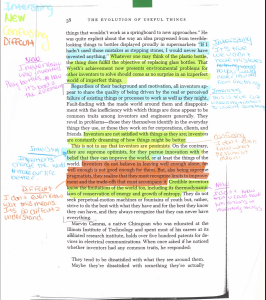3 – Notes and Annotation
Engaging Actively with a Text
Note-taking is perhaps one of the most under-valued steps in the writing process. You may, as many writers before you, be tempted to skip note-taking entirely! In our world today, speed and convenience are prioritized more often than not. However, quality writing assignments typically start with a humble beginning. Taking high-quality notes based on your reading material will save time later on in the writing process.
Activity 1: The Benefit of Notes
Read the following paragraph, which is an excerpt from The Fallacy of Success by British writer, philosopher, and literary/art critic, G.K. Chesterton, who is often considered one of the greatest minds of the 20th century.
When finished, see how many ideas you can remember without looking at the text after one minute.
From The Fallacy of Success
by G.K. Chesterton
“There has appeared in our time a particular class of books and articles which I sincerely and solemnly think may be called the silliest ever known among men. They are much more wild than the wildest romances of chivalry and much more dull than the dullest religious tract. Moreover, the romances of chivalry were at least about chivalry; the religious tracts are about religion. But these things are about nothing; they are about what is called Success.
On every bookstall, in every magazine, you may find works telling people how to succeed. They are books showing men how to succeed in everything; they are written by men who cannot even succeed in writing books. To begin with, of course, there is no such thing as Success. Or, if you like to put it so, there is nothing that is not successful. That a thing is successful merely means that it is; a millionaire is successful in being a millionaire and a donkey in being a donkey. Any live man has succeeded in living; any dead man may have succeeded in committing suicide.
But, passing over the bad logic and bad philosophy in the phrase, we may take it, as these writers do, in the ordinary sense of success in obtaining money or worldly position. These writers profess to tell the ordinary man how he may succeed in his trade or speculation – how, if he is a builder, he may succeed as a builder; how, if he is a stockbroker, he may succeed as a stockbroker. They profess to show him how, if he is a grocer, he may become a sporting yachtsman; how, if he is a tenth-rate journalist, he may become a peer; and how, if he is a German Jew, he may become an Anglo-Saxon.
This is a definite and business-like proposal, and I really think that the people who buy these books (if any people do buy them) have a moral, if not a legal, right to ask for their money back. Nobody would dare to publish a book about electricity which literally told one nothing about electricity; no one would dare publish an article on botany which showed that the writer did not know which end of a plant grew in the earth. Yet our modern world is full of books about Success and successful people which literally contain no kind of idea, and scarcely any kind of verbal sense.”
Ideas you remember from the text (without taking notes):
Now, read the paragraph again. This time take a few notes as you read on a separate sheet of paper about the main ideas. Then, after one minute, write down what you remember.
Ideas you remember from the text (after taking notes):
How did you do? Were you able to remember more after taking some notes? Chances are that you did!
This quote from How to Read a Book might give you a better understanding of why note-taking is a crucial part of the writing process:
“Why is marking a book indispensable to reading it? First, it keeps you awake—not merely conscious, but wide awake. Second, reading, if active, is thinking, and thinking tends to express itself in words, spoken or written. The person who says he knows what he thinks but cannot express it usually does not know what he thinks. Third, writing your reactions down helps you remember the thoughts of the author” (Adler and Van Doren, p. 49).
As the authors state, note-taking is an active process that helps the reader engage with the text and think critically. By taking notes, one is able to form thoughts and opinions rather than simply passively reading or listening to information.
Annotation vs. Notes
In past English or literature classes, you may have heard an instructor mention “annotate” or “annotation” before. What is the difference between annotating a text and taking notes? According to the Online Etymology Dictionary, annotate comes from the Latin word annotatus which means to “observe, remark, note down.” Someone who annotates a text is thinking critically about the ideas presented in the text, asking questions, and making comments.
To put it simply, annotation is a process that helps a reader make sense of information in the text and form their own ideas and responses. Instead of just passively highlighting ideas or writing a few words, the reader is also commenting on the information.
Take a look at the sample page below to understand the idea of annotating.
A Student’s Annotations of
Henry Petroski’s The Evolution of Useful Things

Source: Shivers, J. (n.d.). Annotations: A Visual Record of the Reading Experience.

Key Point: What should I write in my notes and annotations?
- Important ideas from the text
- Questions about the content
- Your own opinions/response to the text
- Anything else you want to remember or come back to later
Note: Don’t forget to label or separate the author’s ideas and your own ideas! Doing so will save you a lot of time later on.
Activity 2: Engaging with a Text
One way to annotate is to create a T chart. Start by writing down the main ideas and other important bits of information from the text on the left-hand side of a piece of paper. On the right-hand side, write down your own ideas and opinions based on the text. This will help you separate out the author’s ideas and your own for future steps of the writing process.
One online tool you can use for T-charts and other note-taking organizers is Visual Paradigm Online. Organizing your notes is an important step in helping you use them later for tests, assignments, and papers you may write.
Read this article entitled “How Reading Science Fiction and Fantasy Can Build Resilience in Kids” from Greater Good Magazine. Once finished, create a T-chart for your annotations using the online tool or a simple pen and paper.
What do I do with my annotations?
Once you have written down some annotations for a text, you may wonder what you will do with these notes later. Here are a few ways annotations can help you:
- Organize your thoughts and questions from reading
- Contribute to class discussions on the text
- Help to build connections and realize patterns
- A starting point for an initial written draft
This section adapted from Advanced English by Allison Kilgannon
Activity 3: Forming Your Own Opinions Using Annotation
Use the following article on the debate about electric vehicles. This article could be used for in-class debate or the start of an opinion-based paper.
“EVs Are the Future, but Are They Really All That Eco-Friendly?” by Jason H. Harper from Robb Report
Annotate the article as practice. Be sure to ask questions about facts and ideas presented. What are your thoughts and opinions about the article? Do you agree? Disagree?
Other Possible Note-Taking Techniques:
- Mind Maps – visual layout of connected ideas
- Outlining – Creating headings, subheadings, and details to organize ideas
- Tables – Divide important sections or concepts into different areas of a page
- Recording notes – great for reviewing and writing down important ideas later
————————————————
References:
Adler, M. J., & Van, C. (2006). How to read a book: the art of getting a liberal education. Simon & Schuster.
Annotate. (n.d.). Search Online Etymology Dictionary. Etymonline.com.
Chesterton, G.K. The Fallacy of Success. (1909). In americanliterature.com.
Harper, J. H. (2021). EVs Are the Future, but Are They Really All That Eco-Friendly? Robb Report. https://robbreport.com/motors/cars/electric-vehicle-sustainability-1234642424/
Jones, E. (2020) How Reading Science Fiction Can Build Resilience in Kids. Greater Good. https://greatergood.berkeley.edu/article/item/how_reading_science_fiction_can_build_resilience_in_kids
Kilgannon, A. (2021). Advanced English. In opentextbc.ca. BCcampus. https://opentextbc.ca/advancedenglish/
Shivers, J. (n.d.). Annotations: A Visual Record of the Reading Experience.
